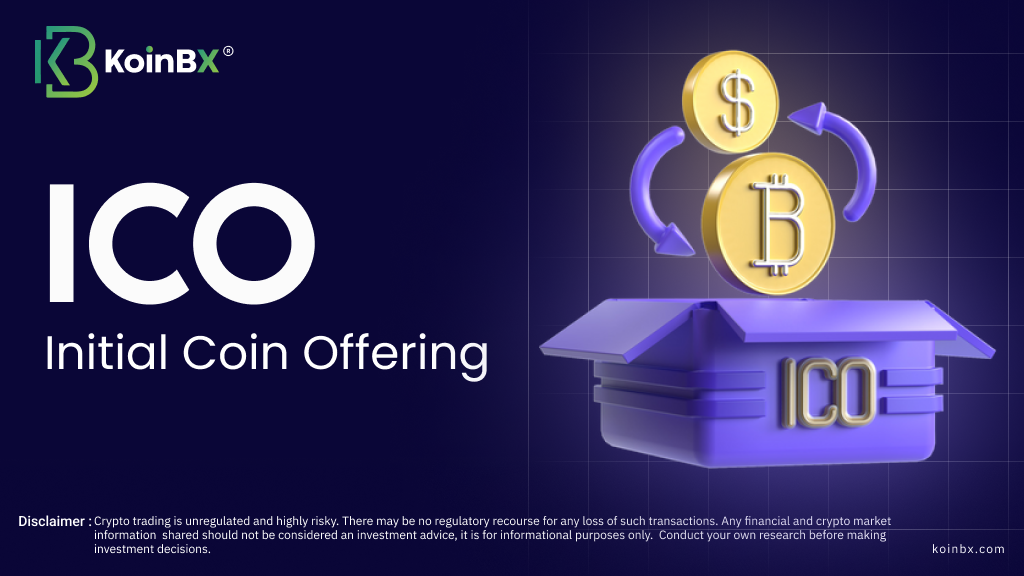Raising funds for new projects can be challenging, especially for startups in the crypto industry. That's where the Initial Coin Offering (ICO) comes in. ICOs have revolutionized the way projects secure capital, allowing them to bypass traditional fundraising methods. But what exactly is an ICO, and how does it work? Let’s dive in and explore the ins and outs of ICOs, their advantages, and disadvantages, and why they’ve become a go-to method for many blockchain-based projects.
What is Initial Coin Offering?
An Initial Coin Offering (ICO) is a way for a team to raise funds for a crypto project. During an ICO, a blockchain-based token is created to be offered to early adopters. This process is similar to crowdfunding, where users receive tokens in exchange for their investment. These tokens can either be used immediately or at a future date, depending on the project's development timeline.
It was first used to raise funds for the development of Ethereum in 2014. Since then, hundreds of companies (especially during the 2017 boom) have adopted this approach, with varying levels of success. It may sound similar to an Initial Public Offering (IPO), but the two are very different approaches to raising capital.
Most IPOs involve established companies selling partial ownership stakes in their business as a means of raising capital. On the other hand, an ICO is a fundraising tool that enables companies to raise capital for their project at an early stage. When an ICO investor buys a token, they are not purchasing ownership of the company.
An ICO may be a viable option for tech startups instead of traditional funding. These startups often struggle to secure investment without a tangible product, and traditional investors may be hesitant to back a project based solely on a whitepaper. In this context, ICOs provide a unique opportunity for these projects to raise funds and bring their vision to life.
How does ICO work?
An ICO can take a variety of forms. In some cases, the issuing team will have a working blockchain that they intend to continue developing in the months and years to come. In such cases, users can purchase tokens that are delivered to their respective addresses on the blockchain.
Alternatively, the blockchain may not have yet been established, and the tokens will then be issued on a well-established blockchain (e.g., Ethereum). Upon the launch of the new chain, holders can exchange their tokens for new tokens issued on the new chain.
For the most part, however, tokens are issued on a blockchain that is capable of supporting smart contracts. Again, Ethereum is the primary platform for this, as many applications adhere to the standard of ERC-20 tokens. Although not all Ethereum tokens originate from ICOs, it is estimated that there are currently more than 200,000 distinct Ethereum tokens in existence. This approach enables them to capitalize on the network efficiencies of a well-established ecosystem and provides developers with access to proven tools.
An ICO is a public announcement that outlines the terms and conditions of its operation. The terms and conditions of the ICO may include a timeline for its operation, a hard cap on the volume of tokens sold, or a combination of both. Participants may also be required to register on a whitelist prior to the ICO.
Users then transfer funds to a designated wallet – typically Bitcoin and Ethereum due to their widespread adoption. Buyers either provide a new wallet address to receive tokens or tokens are automatically transferred to the address from which the payment was made.
Also Read: Proof of Work (PoW) and Proof of Stake (PoS)
Advantages of ICO
1. Instantly accessible for investors and startup companies
It is important to note that each investor has their own specific financial constraints when it comes to selecting the appropriate investment in order to expand their portfolio. Due to the scarcity of stocks and venture capital funds, companies that utilize cryptos as investment tokens offer greater access to a wider range of investors from various economic backgrounds. This is beneficial for startup companies that may not yet have the capital to launch their project but may be able to increase their value in the future.
2. Online Accessibility
The main benefit of an ICO is that all transactions are carried out online. All transactions can be easily monitored and tracked online.
3. High Liquidity
High liquidity is the ability to buy or sell an asset in the market in a short period without significantly impacting its value. Crypto coins are relatively more liquid than other assets because they are safe and efficient and do not need to be exchanged in a physical form. They also move faster than other assets. Investors can also monitor the performance of their investments by monitoring the company’s performance in secondary markets and its price in real time.
4. Less Paperwork
Investment in traditional assets, such as IPO, stocks, bonds, or other exchange forms, is dependent on a variety of regulatory filings that typically require a significant amount of time and effort. Even when these filings are subject to multiple confirmations, there is a risk that the investments may not receive the exposure they require to raise capital from the market.
5. High Return on Investment
Some of the best ICOs started with a low value and continued to increase in value over time. But what makes them truly great is that they offered something new and exciting to investors that others simply weren’t able to.
Disadvantages of ICO
1. Lack of Regulation
One of the biggest risks associated with ICOs is the lack of regulation. In contrast to the traditional financial markets, the crypto space is still largely unregulated, which means that there are fewer protections for investors. This lack of oversight can lead to fraudulent projects or scams, where investors lose their money without any recourse.
2. High Risk of Failure
Many ICOs are launched by startups that are still in the early stages of development. While this offers the potential for high returns, it also means that there is a high risk of failure. Projects may not deliver on their promises, or they may fail to gain traction in the market. In such cases, the value of the tokens can plummet, leading to significant losses for investors.
3. Volatility
The crypto market is known for its volatility, and this extends to ICO tokens as well. This volatility can make it difficult for investors to predict the future value of their tokens and can lead to rapid gains or losses.
4. Scams and Fraud
The unregulated nature of ICOs also makes them a target for scams and fraudulent activities. These scams can be difficult to identify, especially for inexperienced investors, and can result in the total loss of invested funds.
5. Technical Barriers
Participating in an ICO often requires a certain level of technical knowledge, such as understanding how to use crypto wallets or navigate blockchain. For those who are not familiar with these processes, participating in an ICO can be challenging and may increase the risk of making mistakes, such as sending funds to the wrong address or losing access to tokens.
Also Read: Risk and Rewards of Investing In ICOs And IDOs
Final Thoughts
ICO has proven to be one of the most effective ways for early-stage projects to raise capital. After Ethereum launched its ICO in 2014, hundreds of companies were able to raise capital to create new protocols or ecosystems.
However, buyers need to be aware of the risks associated with such investments, as there is no guarantee of return. Due to the current state of the crypto market, such investments present a high degree of risk, and there is little in the way of safeguarding if the project does not produce a viable product.
Download KoinBX Android App | Download KoinBX iOS App
Disclaimer: Any financial and crypto market information shared should not be considered investment advice. It is for informational purposes only. Conduct your own research before making investment decisions. Crypto trading is unregulated and highly risky. There may be no regulatory recourse for any loss of such transactions.






Comments